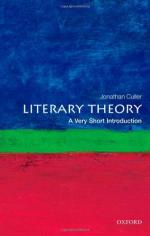
|
| Name: _________________________ | Period: ___________________ |
This test consists of 15 multiple choice questions and 5 short answer questions.
Multiple Choice Questions
1. What is the literary device that is an over exaggeration of a word or idea?
(a) Theme.
(b) Satire.
(c) Hyperbole.
(d) Tone.
2. According to Culler, what power is given to literature by literary performatives?
(a) The ability to make the present obsolete.
(b) The ability to change the world.
(c) The ability to understand the world.
(d) The ability to cause chaos.
3. What culture put literary works into only three groups?
(a) The Swiss.
(b) The Romans.
(c) The Americans.
(d) The Greeks.
4. In Chapter 8, how is the true nature of a character often revealed in literature?
(a) Through personal challenges.
(b) Through the past.
(c) Through a dramatic revelation.
(d) Through family.
5. According to Culler, when it comes to performative language, what is required to give a word or a phrase weight?
(a) Syllable count.
(b) Spelling.
(c) Repeatability.
(d) Origin.
6. What is accomplished by literary performatives, according to Culler?
(a) They create a state of affairs.
(b) They educate theorists.
(c) They present various concepts.
(d) All of these.
7. In Chapter 7, performative language phrases are not required to be _____________.
(a) Interesting.
(b) Intra-dependent.
(c) None of these.
(d) Popular.
8. According to Culler, what attracts readers to a character?
(a) Empathy.
(b) A desire to learn from him.
(c) Interest in their struggles.
(d) All of these.
9. According to Chapter 6, what do readers seem to enjoy in narratives?
(a) Plot twists.
(b) Interesting characters.
(c) All of these.
(d) A satisfying conclusion.
10. What great thinker believed plot to be the most significant part of a story?
(a) Voltaire.
(b) Plato.
(c) Beauvoir.
(d) Aristotle.
11. What form of narration tells a story from an "I" point of view?
(a) Second Person.
(b) First-person.
(c) Third Person.
(d) Omniscient.
12. According to Culler, poetry's imagery has the power of ____________.
(a) Literary advancement.
(b) Judgment.
(c) Persuasion.
(d) Support from scholars.
13. According to Chapter 6, what is the purpose of withholding information from a reader?
(a) To confuse the reader.
(b) To frustrate the reader.
(c) To build suspense.
(d) To appear intelligent.
14. What should a novel be according to Mikhail Bakhtin?
(a) Short.
(b) Poetic.
(c) Polyphonic.
(d) Singular.
15. According to Culler, what do literary works offer their readers?
(a) Models of identity.
(b) Appropriate names.
(c) None of these.
(d) Detailed plans on how to revolt.
Short Answer Questions
1. What type of poetry allows the reader to listen in on the narrator's thoughts?
2. Instead of providing tested solutions, Culler teaches that theory aims to ____________.
3. According to Chapter 7, a declarative statement that promises action can be defined as ________________.
4. Who was J.L. Austin?
5. According to Chapter 6, what type of narrator do readers most trust?
|
This section contains 428 words (approx. 2 pages at 300 words per page) |

|




